- Home
- Will Hobbs
City of Gold Page 4
City of Gold Read online
Page 4
I studied it out and decided it could be done with a bit of a running start. A grim laugh seemed to help. I ran to the edge and took my leap. My feet found the landing but couldn’t hold. My hands reached out to break my fall, but my chest met the ledge with such force, the wind was knocked out of me.
It took a scary while before I was breathing again. I got to my feet with only scrapes. Five minutes later I was off the ledge and standing on the mountainside where the sheep had watched my antics. I was on the trail again but the switchbacks were disappearing by the moment under heavy snow. I thought I heard a steam whistle blow, and chalked it up to a delusion.
Farther down the mountain the snow changed to sleet and then to rain. I was able to make out where I was going. Grabbing hold of scrub willows and rocky outcrops, I worked my way down a creek that fell in leaps and bounds from the heights.
Mine works promised people and warmth, but I found them cold as the tomb. I headed down the steepening slope in the cloud, then held up, and it’s a good thing I did. Yards away, at the brink of a precipice, the creek went over a cliff.
A few steps closer to the waterfall and I heard a whistle blow two, three times. I drank from my canteen, wishing the water were warm. The sun broke through, illuminating the scene below, a box canyon of stupendous proportions. Way down on the valley floor, a train was in motion. Chuffing and puffing and spouting smoke, its locomotive was pulling freight on flatcars.
My eyes went where the train was headed. Nestled in that alpine valley, hemmed in on three sides by soaring mountains, lay a mining town. This frozen fool was going to make it. Telluride was in my sights.
8
City of Gold
THE STORM CLOUDS were racing away as I planted my feet on the valley floor, where a heavy rain had fallen. Mud puddles were everywhere. Within minutes, at the closed end of the box canyon, I came across a mill complex with stacks belching black smoke. The noise was deafening. The industrial thunder, ominous and repetitive, was coming from rows upon rows of ore-crushing machines stamping up and down. Amid the din, workers were swarming like ants stirred with a stick.
Rocks clattering down chutes into the mills made a racket of their own. The ore was carried down the mountain in buckets suspended from two separate aerial tramways. The air was acrid with chemicals. I lurched on by, barely noticing the cyanide ponds if at all. I was still cold to the bone and shuddering. At a railroad siding, men in overalls were loading sacks of concentrates onto a flatcar. I failed to notice the boarding houses, store, and post office, and didn’t realize this was something of a settlement. As I would come to learn, the place was called Pandora.
The road under my feet had deep wagon ruts and tracks of horses and mules. I had to hope that Hercules and Peaches were here, not who-knows-where. I intended to find them and soon. Somehow, some way, I would claim them for my own.
With a couple open miles to go, Telluride was in my reach at last. The edge of town looked like a jumble of ramshackle shanties thrown up cheek by jowl on the sloping floor of the towering box canyon. Till would’ve approved of the raw look of it, I thought with a grin.
Unbeknownst to me, the creek on my left was the fresh-born San Miguel River. Below Pandora it ran yellow with the residues of heavy metals hewn from the innards of the mountains.
Where the railroad spur and the stream steered toward the low side of town, the road aimed straight ahead and became Colorado Avenue, Telluride’s main street. I was walking into the sun and no longer shivering.
In the first few blocks, the saloons outnumbered the stores, offices, and shops. I was thankful for the boardwalks. They kept me out of the muck and mire of the street, which was swarming with bugs. I was bitten by a horsefly while my attention was on six mules pulling a heavily laden freight wagon.
The men heading into the saloons looked rough enough to suit Till, and some were armed.
A few blocks farther on, Telluride looked substantial and prosperous. A banner strung across the street proclaimed the town motto, CITY OF GOLD. The courthouse and the New Sheridan Hotel were both faced with brick. The hotel included a restaurant, bar, and opera house.
Looking to get free of my rucksack, I considered a room for the night at the New Sheridan, but not for long. Ma had given me ten silver dollars for the trip and I had to watch every penny. A boarding house would be more like it. At the corner I walked up Oak Street in hopes of spotting one. A most unusual sight brought a smile. At the head of the street dozens of mules were returning single file to town with empty packsacks and no packer minding them. They weren’t connected in a string; their halter ropes were looped around the forks of their packsaddles. Each mule was free to go where it pleased, but evidently they were all making a beeline for the barn.
The street was lined with dandy two-story homes with all the frills of the Queen Anne style my mother admired along Durango’s Third Avenue. Ma would have been tickled by the sight of these mules with empty pack bags, their working day done, promenading down this lovely street unaccompanied. The steep, sunny slope behind them was ablaze with aspens in their autumn finery. As if that display wasn’t sufficiently colorful, a parade of red cliffs ran through those immense swaths of gold. My mouth was agape as the mules began to pass me by.
Intending to follow them to their stables, I ran to catch up. I was approaching Colorado Avenue when two men crossing the street caught my attention. The one with the gun belt looked an awful lot like our thief—the mackinaw coat, the hat, the short-cropped black beard.
As I reached the corner, the two men disappeared into the Sheridan Bar.
I couldn’t be sure he was the one. There could be hundreds in this town who resembled him. What was I going to do, accuse him in the saloon?
Then what? Better to find our mules first. Then I could sic the law on him.
Here came some mule trains bearing heavy loads. Each string of sixteen was led by a man on horseback. The packers looked unsavory and unfriendly. The burdens their mules carried were familiar: sacked concentrates identical to the ones that passed our Hermosa place every day, heaped on flatcars and headed for the smelter in Durango. I’d heard it said that each sack weighed a hundred pounds. The mules I was looking at carried three—one in each canvas pannier bag and one atop.
I followed the mule parade across Colorado Avenue and downhill toward the railroad and the river. Where the packers led their strings to a flatcar on a siding, I headed west with the unburdened mules that were on their own and presumably heading for the barn. I would’ve followed them but was waylaid by my hunger. MARIE’S BAKERY said a sign on the corner across from the depot. I should celebrate my survival; something sweet would hit the spot.
That late in the afternoon I was lucky to find the store open. The shelves were all but bare, and no one was there except the raven-haired girl behind the counter. Her dress was colorful and painfully clean. I ran my grubby hands through my filthy hair in an attempt to tame it a little. “Good afternoon,” she said with a wry smile. “How may I help you?”
I must’ve looked like a boulder with legs that tumbled off the mountain in the storm, gathering another layer of mud with every revolution. I met her eyes with a passing glance; she was so pretty I had to look away. I spied two long, skinny loaves of bread on an otherwise empty shelf and asked her how much for both.
“A nickel,” she said brightly.
“You sure? Looks like supper and dessert to me.”
“They’re going stale. A nickel is fine.”
I swung my pack off my back and began to open it up. Flakes of mud were falling to the floor. “No need,” she said. “Come back Monday with that nickel.”
“Monday?”
“Tomorrow’s Sunday. We’ll be closed.”
“I lost track. I’ll see you Monday, then.”
I took the loaves from her hands and was about to leave, happy my embarrassment couldn’t show through the sediment on my face. I had my hand on the doorknob. “You hiked into town?” she asked.
>
I let go the door. “Over the mountains from Durango.”
“All that way . . . It’s beautiful here, especially with the aspens turning. Is that why you came? Sometimes tourists come on the train and rent horses.”
“A rustler stole our mules. I tracked them here.”
“Really? What a story. We had a bank robbery here—the San Miguel Valley Bank—but that was eleven years ago. You’ve probably heard of it.”
“I don’t think so.”
“Butch Cassidy and two cohorts. They stole twenty-one thousand dollars in greenbacks and gold coins. Some say it was more like twenty-four thousand. It was his first heist.”
“My kid brother would know all about it. He loves those stories—men on horses, men with guns.”
Our conversation was about to die out, but I kept it going. “About the mules coming off the mountain . . . Do the ones with nothing to carry come back to town on their own?”
“They do. They’re free as birds. They might snatch at wildflowers on the way down, but mainly they’ve got hay and oats on their minds, back at the stables.”
“The mules carrying loads need minding, I take it?”
“Uphill or downhill, they always have packers with them. Heavy labor is not their idea of a good time.”
Just then I heard footsteps on the stairs. I glimpsed a woman—her mother? “I should be going,” I said.
“Good luck finding your animals!”
Outside, while gnawing on the French bread, I eyeballed a string of packed mules passing by. About the diameter of my wrist, the bread sure was crunchy. I could save the second loaf for a club in case I got jumped in an alley. Now that I chawed on it some, I found the inside soft and delicious.
Too bad I hadn’t learned her name, but there would be another day. I should have asked where the telegraph office was. I’d promised Ma I would send a telegram soon as I could.
I followed some unattended mules west onto Pacific Avenue past warehouses, saloons, boarding houses, a laundry, and an ironworks. Nearing the edge of town I saw the heads of a couple hogs bobbing down the river. No bodies, just the heads. I’d never seen a place half as raw as Telluride.
9
Sold to the Tomboy
ROGERS BROTHERS LIVERY & Feed was a big outfit. They had an office where you could rent horses, but I went around the side where the mules returning from the mines were headed.
I got as far as a corral where handlers were relieving mules of their pannier bags and packsaddles. I noticed a couple with running sores, which pained me greatly. A few others had swollen forelegs and ankles, most likely from being worked beyond their legendary strength and endurance. A mule’s height and muscle strength come from its horse mother, while its leaner build and nimble legs come from its donkey father. The hooves and legs of a mule are stronger than those of a horse, which is why mules seldom go lame. Some of these were due for a good rest.
I asked after the head stableman and was pointed to a lanky fellow with a big silver belt buckle. I was afraid he’d throw me out on my ear soon as he heard what I was after. “Chet Hamlin,” he said as he shook my hand.
I spit out my name and my problem. It wasn’t half a minute before Hamlin was nodding, and broke in helpfully. “A stranger showed up with two mules day before yesterday. One was the biggest I’ve ever seen, and I’ve seen a lot of mules in my day. Wonderful animal in every regard. Dark brown with rings around his eyes and a white muzzle.”
“That’s our Hercules.”
“An apt name, if he’s yours. Stolen, you say?”
“From our barn in Hermosa. We brought him and Peaches all the way from Kansas to plow our new farm. Did you notice the brand? Did some of it look fresh burned?”
Hamlin was taken aback. “Didn’t see a brand. The mule had been in some mud, come to think of it. They like a good wallow.”
“Were you looking to buy them?”
“We would’ve bought both, but the fellow was only selling the big ’un and his packhorse.”
“Was he a hard-looking man with a dark beard, short cropped?”
The stableman nodded, but cut himself short. “I stay out of police business. I’ve got my own concern to look after.”
I didn’t know what to make of that. “You were looking to buy Hercules, you said, but you didn’t?”
“The buyer for the Tomboy Mine was keen on the big mule, and our pockets aren’t as deep as theirs. The Tomboy is a big company.”
“So, where would I find Hercules?”
“Might be still in town . . . could be up at the Tomboy.”
“Where’s that?”
“At timberline in the Savage Basin, six miles out of town and three thousand feet up. They rent big numbers of our mules for the daily trip up and down, but they own a couple dozen. Keep most of them up there year-round.”
“What for?”
“To work inside the mountain, pulling ore cars.”
The very idea was horrifying. I had to find Hercules and fast, while he was above ground.
“What about Peaches?” I asked. “She’s gray, with spots on her rump.”
“The man said he was keeping her for a riding mule.”
“I better see the marshal here, and soon.”
Hamlin’s features clouded. “I wouldn’t rush that. Do you have papers on the animals?”
“I’m afraid not.”
“Better get the lay of the land first. You don’t want to get on the wrong side of Jim Clark. He’s a difficult man.”
“Well, I’ll be back, to rent a horse to go up to the Tomboy.”
“Good thinking.”
The stableman asked if I had people in town. I told him I used to, that my uncle died in an accident in the Smuggler-Union Mine.
“Sorry to hear that. No doubt he was a union man.”
“For certain. He sang its praises in his letters.”
Chet Hamlin told me of a boarding house favored by men who had worked in the mines and were no longer able. I would be well received there. “Hurry along, you might catch supper. If I’m not mistaken, on Saturday it’s beefsteaks and beer.”
Oma Oleson’s Boarding House was in the warehouse district not far from the depot and the bakery. Nobody was at the desk in the front parlor. I was surprised by the electric lights but shouldn’t have been. Durango had electricity, same as Lawrence. Our new farm in Hermosa didn’t, same as the old one in Kansas.
From down the hall came voices and the rattle of dishware. I tucked my unsightly rucksack behind the desk and made my way down the hall in hopes of a meal and a bed.
The doors of the brightly lit dining room were wide open. I spied three tables with grizzled men on benches shoveling food from platters and pouring beer from pitchers. There didn’t seem to be a spot where I might squeeze in.
Heads and eyes turned my way, and the clamor of conversation was replaced by near silence. They seemed like they were looking at some rare curiosity. Two women bearing platters of beefsteaks stopped in their tracks. I must’ve looked like I’d been dragged through a knothole and beat with a stick.
I spoke up. “Sorry about the interruption. I was hoping to stay here. My uncle was a miner at the Smuggler-Union.”
“What was his name, sonny?” called one of them.
“Jacob Hollowell.”
Murmurs filled the room. I wondered if somehow my uncle’s reputation was south of shady.
One of the men rose, steadying himself on the table. “Jacob Hollowell was my particular friend,” he declared. His voice was raspy, his breath wheezing. “You must be his nephew Owen, from Kansas.”
I was more than surprised. “That’s me,” I agreed. “Owen Hollowell.”
“How ’bout that!” cried another man. “You’re mighty welcome here. We got a bunk for the boy, Oma?”
The older of the two women, with a red-and-white-checked apron and her silver hair in a bun, was quick to reply. “You betcha ve do!”
Cheers filled the room.
&
nbsp; My uncle’s friend was beckoning, and a place opened next to him.
Seconds later they were raising glasses to the memory of my uncle and to Local 63. Their accents were many. The wheezing ex-miner at my elbow, Merlin Custard, introduced himself as a “hard-rock Cornishman.” I didn’t know Cornishmen from corned beef, but his accent sounded English. He cleared up my confusion by adding that Cornwall was a region of England.
Merlin might have been no older than fifty but looked emaciated, spectral even. His nearly translucent skin, drawn tightly over the bones of his face, had a blue tinge. He stared at me with unblinking pale blue eyes and said, “You favor Jacob to be sure.” As Merlin explained, he bunked next to my uncle when both of them lived and worked up at the mine, the Smuggler-Union. The men at supper had worked at half a dozen different mines, but they all knew Jacob because he was one of the leaders of Local 63, their union.
In no time at all I was looking at a steak, a baked potato, string beans and carrots, and a thick slice of bread. “Hope you’re hungry,” Merlin said.
“Starving.”
“Dig in, then!”
I did as I was told. Soon as I slowed down, the men at the table wanted to hear my story. I explained that shortly after my father died, we learned we had inherited the Hermosa place from his brother who died in an accident in the Smuggler-Union. Their reaction at hearing that last part confused me no end. Some were muttering, others were exchanging wrathful glances. “What is it?” I asked Merlin.
“Your uncle was vice president of our union chapter. What did you—” Merlin ran out of breath but began again. “What did you hear of this so-called accident?”
“Only that he fell down a shaft.”
“Fell?” Merlin was incredulous. A chorus of oaths arose.
Merlin fixed me with blue eyes blazing. “We believe he was pushed.”
With that my uncle’s friend clammed up, seized his knife and fork, and attacked his steak with a vengeance. I did the same, hoping I would learn more when the time was right.

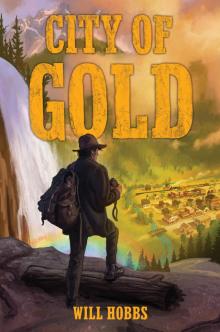 City of Gold
City of Gold Kokopelli's Flute
Kokopelli's Flute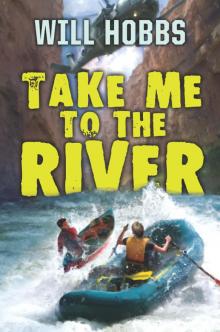 Take Me to the River
Take Me to the River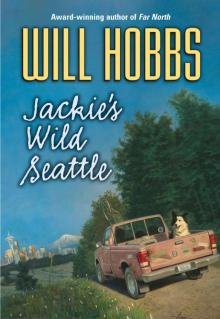 Jackie's Wild Seattle
Jackie's Wild Seattle The Maze
The Maze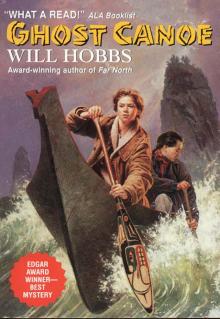 Ghost Canoe
Ghost Canoe Never Say Die
Never Say Die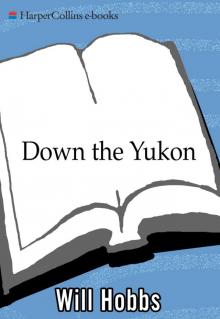 Down the Yukon
Down the Yukon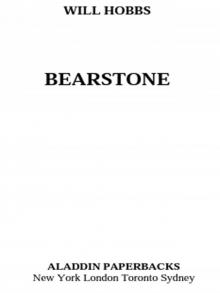 Bearstone
Bearstone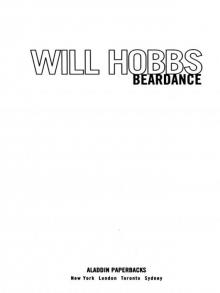 Beardance
Beardance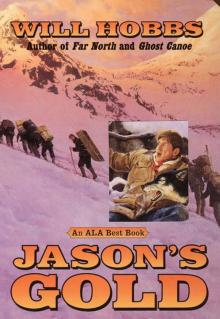 Jason's Gold
Jason's Gold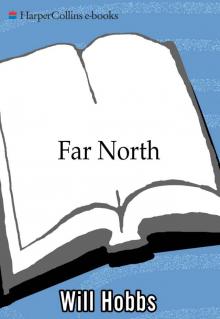 Far North
Far North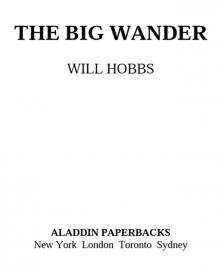 The Big Wander
The Big Wander River Thunder
River Thunder Downriver
Downriver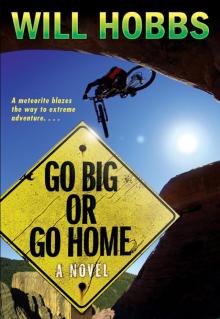 Go Big or Go Home
Go Big or Go Home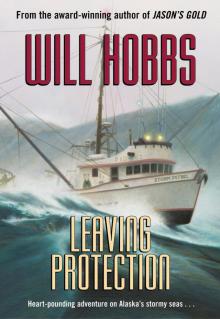 Leaving Protection
Leaving Protection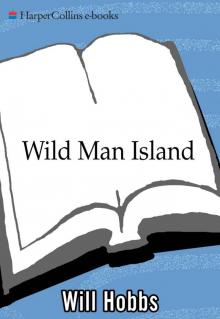 Wild Man Island
Wild Man Island